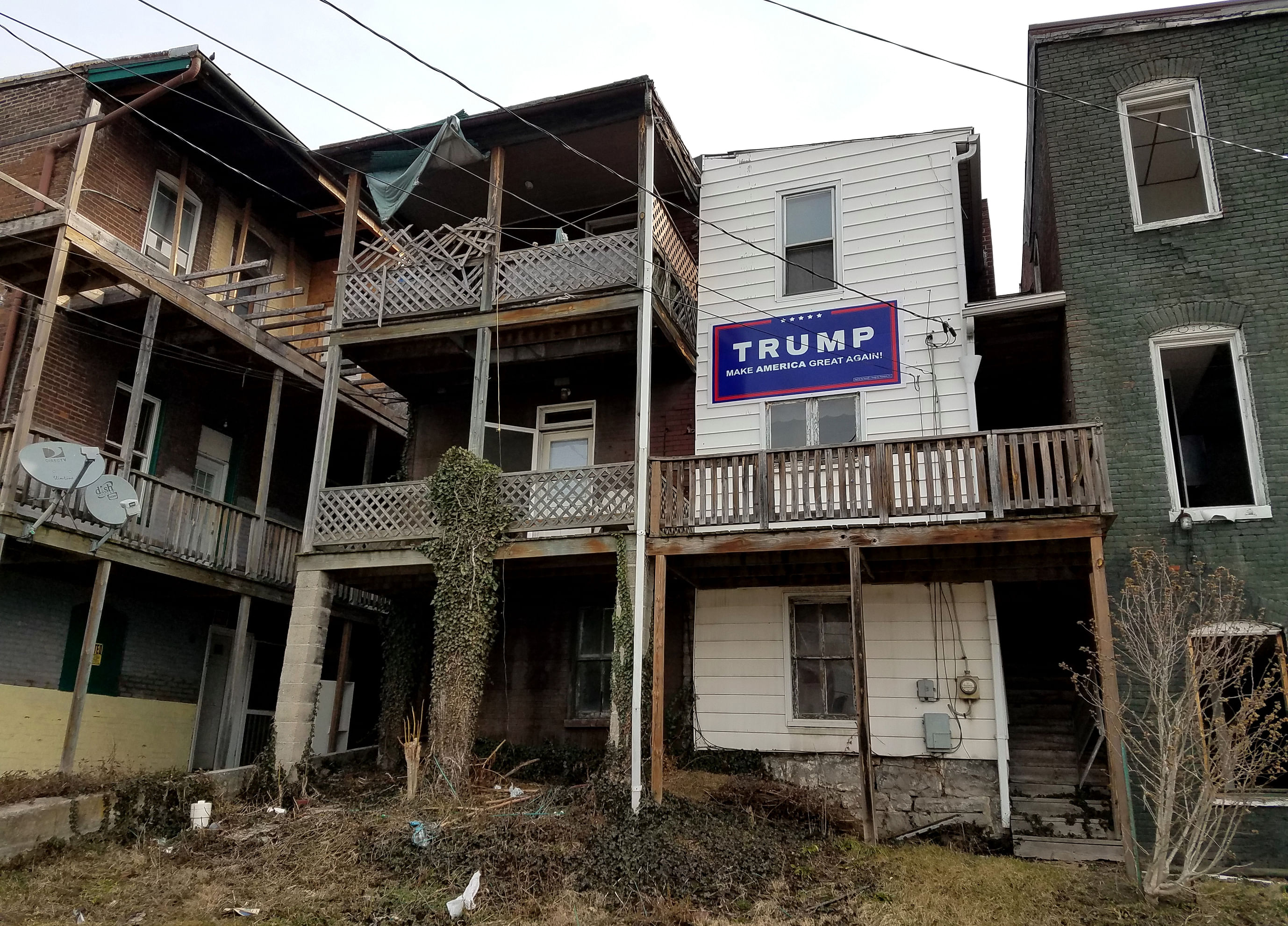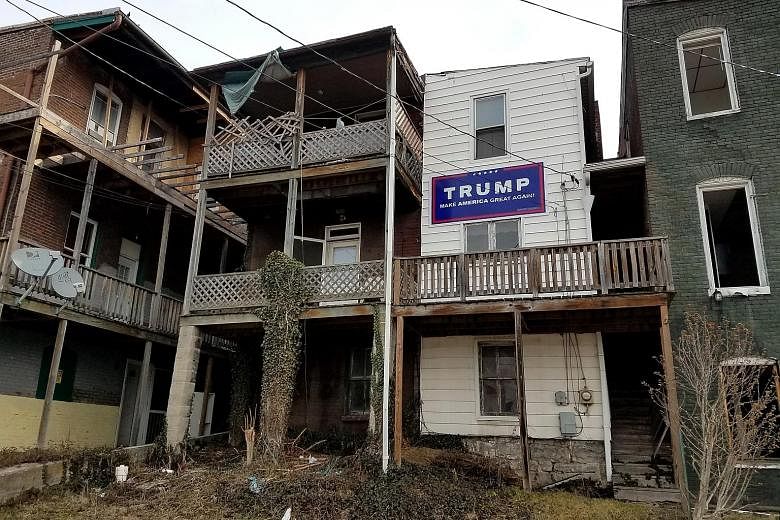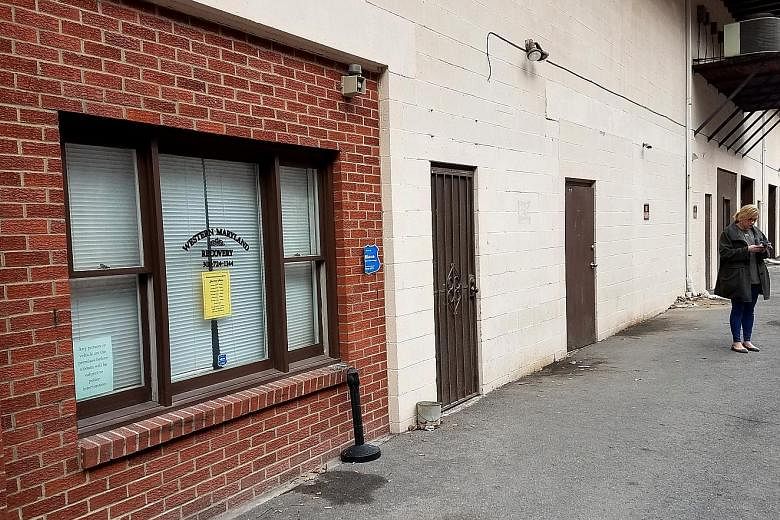It was around late 2015 that police in Maryland noticed the resurgence of heroin.
"It came on hard and fast, like a hurricane - and we are still in the middle of it," said Cumberland Police Captain Greg Leake in an interview in his office last Tuesday.
As he spoke, his mobile phone buzzed constantly with updates on raids planned that night on illegal opioid suppliers.
The department has its hands full fighting a multi-headed target homing in on a ready market.
Maryland, next to the nation's capital, has seen a sharp increase in deaths due to drug overdoses - both of heroin and legal prescription opioids or painkillers.

While drug addiction is driven by a cocktail of factors, the correlation to economic decay is inescapable.
With a population of around six million, Maryland has lost 25,000 manufacturing jobs since 2007.

In his inaugural speech, President Donald Trump referred to an "American carnage" not just of inner-city poverty, but a rural despair of rusted-out factories "like tombstones across the landscape" and "the crime and the gangs and the drugs that have stolen too many lives and robbed our country of so much unrealised potential".
Carnage is defined as the killing of a large number of people.
According to Maryland's Department of Health and Mental Hygiene, there were 918 fatal heroin overdoses from January to September 2016, double that of the previous year. During the same period, there were 738 fatal Fentanyl overdoses, four times more than the previous year. Fentanyl is a powerful and addictive prescription painkiller.
Maryland is not alone.
-
AN ADDICTION CRISIS
918
Number of fatal heroin overdoses from January to September 2016, double that of the previous year, according to Maryland's Department of Health and Mental Hygiene.
738
Number of fatal Fentanyl overdoses in the same period, four times more than the previous year. Fentanyl is a powerful prescription painkiller.
Neighbouring West Virginia, with a population of 1.8 million, lost 3,243 jobs between August 2015 and August last year. Jobs from the coal industry made up 21 per cent of those jobs. The industry was once the state's largest employer - hence President Trump's mission to "bring back coal" and create "millions of jobs".
The opioid addiction crisis is coursing largely unseen to the casual eye, across rural America.
Nationwide, overdoses associated with prescription and illicit opioids killed 33,091 people in 2015 - four times as many as in 1999, and the number exceeded deaths by gun-related homicides for the first time.
Across the US, an estimated 83,000 coal jobs were lost and hundreds of coal mines shuttered under the Barack Obama administration, which imposed expensive regulations through the Environmental Protection Agency.
In some small towns across America's mid-western post-manufacturing, post-mining rust belt, the only thriving businesses left are local pharmacies.
This came as the states were yet to fully recover from the 2007 sub-prime crisis, which saw hundreds of thousands of homes and jobs lost, hitting rural Americans especially hard.
As early as 2014, a paper in the American Journal of Public Health noted that opioid misuse was a "growing public problem in need of action and is concentrated in areas of US states with large rural populations such as Kentucky, West Virginia, Alaska, and Oklahoma".
"Economic stressors… may create vulnerability to drug use more generally," the paper said.
"Economic downturns have more adversely affected rural areas in the United States," it added. "Rural counties in particular have faced job sector and industry shifts… resulting in long-term economic deprivation, high rates of unemployment, and fewer opportunities for establishing a long-term career with potential for upward mobility."
At the Alternative Drug and Alcohol Counselling (ADAC) in Hagerstown, Maryland - an hour's drive from Cumberland - Ms Deanna Bailey, 60, one of ADAC's most experienced counsellors, told The Sunday Times: "I see (opioid addiction) happening in more and more areas of low income and little employment, both inner city and rural."
"It's boredom, you know," she said in an interview at the ADAC office, in a house across the road from a lake where Canada geese and a pair of white swans bobbed under a clear blue sky.
"What do you do if you have no money?" she said. "Opiates are painkillers; that means they kill all pain. So if I'm bored, or if I'm poor, and someone gives me a Percocet or offers me heroin, I can take it and to my surprise I feel great, no matter how downtrodden I am, no matter how lousy my situation is. And it becomes a magnet."
There are other factors too: A culture that demands relief from pain; doctors too liberal with prescriptions, and who are often evaluated on how much they can reduce their patients' pain; a pharmaceutical industry marketing painkillers; and in the case of heroin and other deadlier drugs, easy supply routes on America's freeway systems.
And while opioid addiction is egalitarian, its victims are mostly white middle-class, the counsellors and experts in Maryland and West Virginia told The Sunday Times.
The devastation cannot be underestimated.
Ms Keisha Clopper, 27, one of the younger counsellors at ADAC, told The Sunday Times she has lost more than 20 of her classmates - an estimated 15 per cent to 20 per cent - to opioid overdoses.
Separately, at one of Cumberland's methadone treatment centres for heroin addicts, 40-year-old Celesta Harris, a mother of six who spent years on opioids and then on heroin, and went to jail once for robbing a convenience store for cash, told The Sunday Times she has been to 16 funerals of opioid overdose victims in the past five years.
President Trump has outlined his prescription for the opioid crisis.
"We have 5 per cent of the world's population, but use 80 per cent of the prescription opioids," he told a rally in New Hampshire just weeks before he swept to victory in the Nov 8 election last year.
"We will give people struggling with addiction access to the help they need," he promised. Measures would include the expansion of "drug courts" where addicts, instead of being jailed, are closely supervised; and equipping first responders, including police, with Narcan, a drug used to revive overdose victims.
"These steps will ensure that every American struggling with addiction has access to the care and the help that he or she needs," he said.
But he added: "If we are going to bring hope back to our communities, we not only have to solve our drug crisis but (also) our economic crisis."
On Feb 16, he repealed legislation restricting the amount of coal mining debris that can be dumped into streams - just one of a slew of regulations that has been choking the coal industry.
"I am continuing to keep my promise to the American people to get rid of wasteful regulations that do nothing - absolutely nothing - but slow down the economy, hamstring companies (and) push jobs to other countries," he said.


